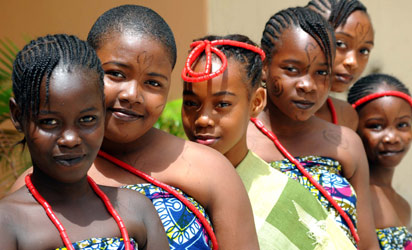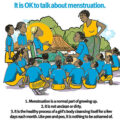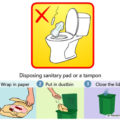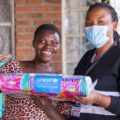Menstruation is a natural phenomenon among matured females who experience shedding of blood for 1-7 days every month from the age of maturity until menopause. Various aspects such as physiology, pathology and psychology of menstruation have been found to associate with health and wellbeing of women; hence it is an important issue concerning morbidity and mortality of female population. On the other hand, hygiene-related practices during menstruation are of considerable importance for reproductive health, poor practices increase vulnerability to reproductive tract Infections.
Good hygiene, such as use of sanitary pads and adequate washing of the genital area, is essential during menstruation is uncommon in many places in Nigeria especially in the rural areas. Women and girls of reproductive age need access to clean and soft absorbent sanitary products, which in the long run protect their health. Menstrual hygiene and management is an issue that is insufficiently acknowledged and has not received adequate attention.
Its not all doom and gloom in Nigeria, Menstrual blood is sacred and not an obstacle for a girl or woman in Yorubaland. Yorubas see the crescent moon as a symbol of renewal, freshness and regeneration. This is why they call the menses nkan oshu meaning ‘sign of the moon’ as oshu (oshupa)means the moon. This is because the women use the waxing and waning of the moon phases as a calendar for their cycles. When the moon is at its highest level of waxing, maidens and new brides pray to it to grant them ‘newness’ (fertility) and the strength to carry a child on their backs. Thus, menstrual blood in Yorubaland does not come with fear, disgust or seen as impure. It is rather seen as a sign of renewal, bounty and fertility.
What is Menstrual Hygiene?
Menstrual hygiene is defined as the principle of maintaining cleanliness of the body during menstrual flow. It requires basic facilities such as appropriate clothes, soakage material, water, soap, and toilet facilities with privacy. Poor menstrual hygiene may lead to problems such as itching or rashes in the perineal region, bad odor, and also major complications such as pelvic inflammatory disease and toxic shock syndrome.
What is Menstrual Hygiene management?
Menstrual Hygiene Management (MHM) is defined as ‘Women and adolescent girls using a clean menstrual management material to absorb or collect blood that can be changed in privacy as often as necessary for the duration of the menstruation period, using soap and water for washing the body as required, and having access to facilities to dispose of used menstrual management materials’
Menstrual Hygiene Practices In Nigeria
Adolescent girls constitute a vulnerable group not only with respect to their social status but also in relation to health. Menstruation is regarded as unclean or dirty in some communities. Although it is a natural process, is linked with several misconceptions and practices which sometimes results into adverse health outcomes. At present, it is estimated that 1 in 10 girls in Sub-Saharan Africa miss school during menstruation, and many girls eventually drop out altogether as a result.
In Nigeria in particular, over 10 million children, mostly girls, are already out of school and the limited access to adequate menstrual hygiene products and facilities is only going to further increase this number. Women’s physical health and mental health is at risk every month during menstruation as a result of myths, restrictions, and ignorance, and until this can be talked about openly, we will not fully understand the extent of the problem.
A review of some studies shows that in Nigeria menstrual knowledge is higher in post-menarcheal girls, 10% and the major source of menstrual information was the family. Although more than half of the girls menstruated regularly, 66.3 %, used non sanitary materials as menstrual absorbent. Results from another showed that the girls’ received menstrual information from undependable sources.
A study conducted in Northern Nigeria observed that poor women and girls in many homes cannot afford purpose made sanitary pads or napkins. Instead, the vast majority of women and girls used rags. Once used, these rags are washed quickly in a small clay pot or a plastic tub of water inside the latrine. The rags are each used several times and often no safe water and soap to wash them properly. This practice, according to researchers , is responsible for a significant proportion of illness and infection associated with female reproductive health in The country.
A recent study reveals a that sanitary pad was found to be the most common (76.6%) menstrual protective materials used by the women in Nigeria. The choice of menstrual hygiene product by majority (42.3%) of the women was not dependent on any particular reason.
Also read:How to Use Pawpaw Leaves For Menstrual Pain






